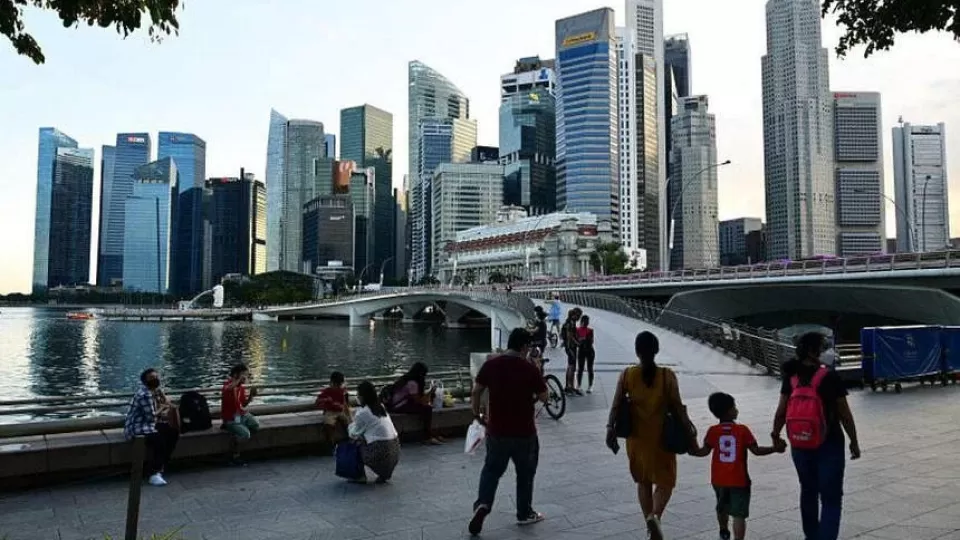March 30, 2023
SINGAPORE – Pitting Singapore and Hong Kong against each other makes for better headlines, but it is simplistic talk that is “rather hyped up” as both cities have their own strengths.
With economies that are closely intertwined, Singapore and Hong Kong benefit from each other growing and bringing vibrancy to this entire region, said Minister for Home Affairs and Law K. Shanmugam.
“By virtue of the geography of both places, and what Hong Kong and Singapore have built ourselves into, both can, and I think will, do very well. It is never a zero-sum game,” he said on Wednesday at the fifth edition of the China Conference: Southeast Asia.
The annual flagship event, organised by the South China Morning Post, brings together government representatives and business leaders to discuss how China and South-east Asia are shaping the global agenda. This year’s conference was held at Four Seasons Hotel Singapore.
The minister said that there is no secret to how both Singapore and Hong Kong have done well, which comes down to governance and stability.
Singapore is a gateway for international capital to Asia, he said. Strong legal frameworks, a network of 27 free trade agreements, and being a key hub for trading, finance, aviation, professional services and shipping, among other things, have put Singapore in a good position, Mr Shanmugam added.
Post-Covid-19-pandemic, the common consensus is that Singapore has emerged even stronger and is one of the places to be, not just in Asia, but the world, he said. “A lot of people found that their money was safe, they were safe, and with a world-class healthcare system and rational policies.”
According to the Monetary Authority of Singapore, the Republic saw $448 billion net inflow of assets under management in 2021, a steady increase from about $200 billion to $260 billion before the pandemic. There was a 75 per cent increase in the number of family offices since the end of 2020, from 400 offices then to 700 by the end of 2021.
Mr Shanmugam said Singapore is in a very strong position to continue to be attractive if Asia, or at least significant parts of it, grow, and if the Republic “remains sensible” with its employment, tax and business policies.
He added that people and investors know that the Singapore Government has the mandate to make the country investor-friendly.
“Investors have always had to consider these factors. Because if you invest, and the policies change because the population is unhappy, then you are in a difficult situation,” he said.
On Hong Kong, he expressed bemusement about talk that it is in terminal decline and has no democracy.
He said Hong Kong has strong links to the Chinese hinterland, and close financial integration with the mainland. This has helped it become one of Asia’s largest equity markets, with more than 75 per cent of the Hong Kong stock exchange’s market capitalisation accounted for by mainland companies.
It is also the largest offshore renminbi centre, and a leading Asian asset and wealth management hub.
Reiterating that he never believed in the pessimistic views that were peddled about Hong Kong, he said the suggestion that Singapore has supplanted Hong Kong gives too much weight to short-term factors, pointing out that the latter has been in transition over the past few years.
“There is a recalibration of its position, vis-a-vis China. Beijing wants Hong Kong to succeed, and that counts for a lot,” he said.
But the analyses of that recalibration, and the pro-democracy protests in 2019 and 2020, have often been too skewed, he said. “Pugilistic references make for better stories,” added Mr Shanmugam.
Beyond the two Asian Tigers, he said that Asia is growing faster than the rest of the world. In areas ranging from manufacturing to the service sectors, South-east Asian economies such as Vietnam and Cambodia, and, farther afield, China and India, are fuelling demand and supply.
Global consulting firm Boston Consulting Group estimated that by 2030, Asean could generate US$600 billion more a year in manufacturing output. A report by another global consulting firm, McKinsey, estimated that half of the global consumption will be in Asia by 2030.
The number of upper- and upper-middle-income households is expected to increase in cities such as Bangkok, Jakarta and Hanoi, said Mr Shanmugam. At the same time, start-ups are attracted to Asia because of the availability of capital to support new innovation and entrepreneurship, he added.
Mr Shanmugam highlighted that despite Asia being so diverse and widespread geographically, each place has its own unique advantages, such as strong rule of law, business ecosystem and sovereignty.
He said: “The real point is this: All of these cities will do well, within their context. Asia is going to be a huge economic giant.”
In a Facebook post on Wednesday, Deputy Prime Minister and Finance Minister Lawrence Wong wrote that Hong Kong and Singapore embrace healthy competition, which motivates both to excel.
“At the same time, we continue to collaborate in many areas, and we continually exchange notes to learn from each other,” he said, adding that he met Hong Kong Financial Secretary Paul Chan on Wednesday.
“We had a good discussion on macroeconomic and geopolitical developments in the region. I look forward to further strengthening cooperation between Hong Kong and Singapore.”

